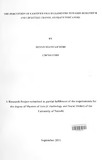| dc.description.abstract | The research was designed lo cover the area of fraud detection and deterrence, mainly focusing on behaviour and lifestyle changes as fraud indicators The study was sought to investigate the perception of certified fraud examiners specifically focusing on these indicators of fraud, how they compare with other indicators and how effective they arc when used in fraud detection
The problem necessitating the study was the continued prevalence and increase in reported cases of fraud despite the established mechanism of fraud detection and deterrence Moreover, behavioural red Hags have only been cited in the media as a possible initial detection indicator however insufficient studies have not been done to categorically state and show how these indicators can be identified and used effectively in fraud detection Thus the study sought to establish which indicators of lifestyle and behaviour changes can be used in initial detection of occupational fraud
The study is exploratory and descriptive in design, seeking to explore the new area of fraud identification using behavioral red flags The study was earned out with the ACFF Kenya chapter members The body was purposivcly selected to shed light on their view of the indicator mainly because they were directly involved in fraud detection and awareness. Since main objective of the study was to capture the perception of the CFEs on the use of this fraud indicator only the trained and certified members were sampled for the study
The study findings revealed that CFEs had nn optimistic and positive perception towards the use of behavioral red flags as indicators of fraud The study showed that the CFEs believed that the indicators of lifestyle and behavior change can be used successfully for fraud identification in all the industries and occupations involved in the study The CFEs also agreed that the use of behavior and lifestyle change can be used effectively However, the study revealed some shortfalls of usage of behavioral red flags such as lack of proper evidencing, tone at the top, and prosecution procedures as possible hindrances for successful closure of cases
XII
The study recommended further study on indicators of behavioral red flags to establish emerging trends of behavioral and lifestyle changes related to fraud commission Also, CFF.s should be proactive in monitoring and surveillance of suspect employees for tip off of existing fraud Further the study recommended that sensitization workshops and sharing of intelligent information is necessary to keep update of the current trends of fraudster behaviors across all industries and occupations. Lastly, the study recommended introduction of policies requiring, wealth declarations, and assets acquisition for new and existing employees. | en_US |



